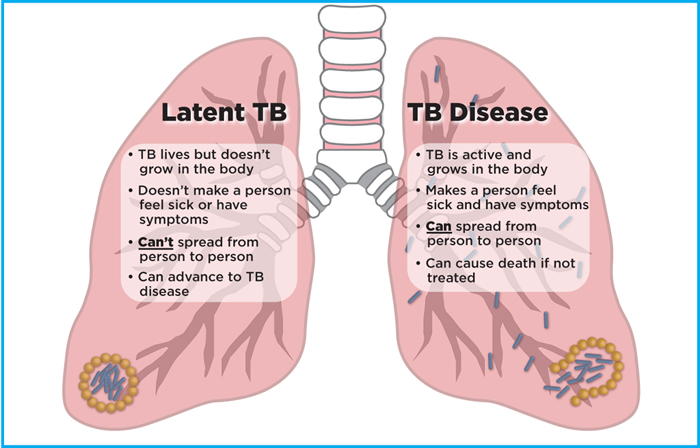
Tuberculosis (TB) is the second leading killer disease in the world and India accounts for 27 % of the total TB cases worldwide. TB is an airborne bacterial infection primarily affecting the lungs but can also impact other organs such as the kidneys, spine, brain, lymph nodes, genitals, intestines and skin. It spreads through the air when an infected person coughs, sneezes or talks. Active TB is treatable but can cause serious complications if left untreated. One-third of the world's population carries the TB bacteria but it mostly lies dormant. This is called latent TB. Latent TB can become active when the immune capacity of the person is compromised leading to symptoms and high contagion rates.
In India, the BCG vaccine is given to infants soon after birth to build their immune systems to fight TB germs.

source: nih.gov.in
As TB progresses, it can cause severe damage to the lungs and other organs, leading to respiratory failure, loss of weight and weakness, spinal deformities, kidney failure or meningitis. TB can also increase the risk of developing other infections such as AIDS due to a weakened immune system.
People with active TB may experience a combination of symptoms as shown in the chart. These symptoms can vary depending on the patient’s immune response.

Direct exposure to people infected with TB increases the chances of contagion, particularly for people with weak immune systems. Other risks are:
After a comprehensive evaluation of your symptoms and physical examination for swollen lymph nodes, the physician may prescribe a combination of the following investigations and screening tests to diagnose or confirm TB:
The treatment of TB involves drugs including antibiotics taken over several months. It is important to complete the entire course of prescribed medication to ensure the infection is fully eradicated and to prevent the development of drug- resistant strains of TB. The complete treatment may take six to nine months. Hospitalisation may be necessary for more severe cases of TB or for individuals who are unable to take oral medications. People infected with TB need a proper diet such as proteins (see the diet plan) fruits, vegetables and whole grains to boost their immune system and aid in recovery.

TB is treatable and by being proactive you can minimise the risk of contracting it. Ensure that you are vaccinated (see Adult Vaccination) particularly if you are in high-risk incidence areas.